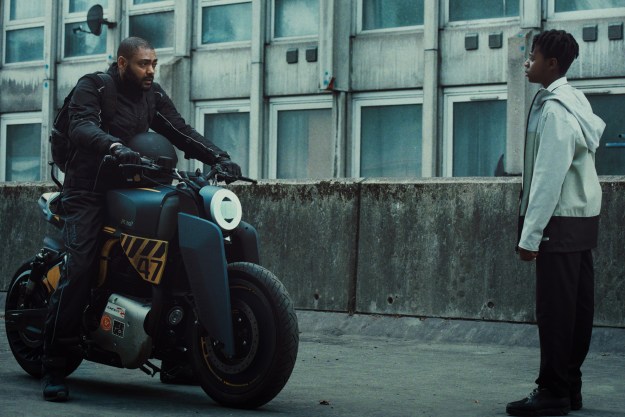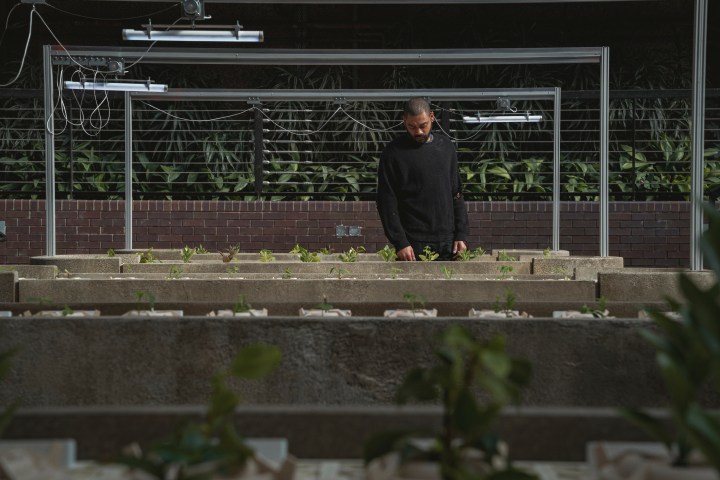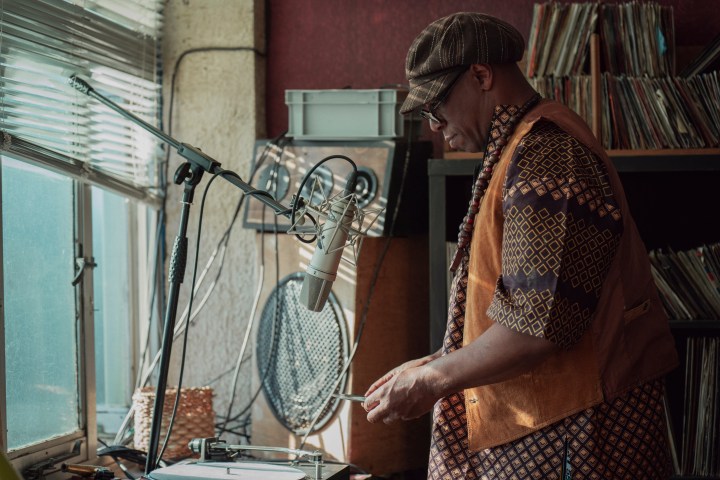
“The Kitchen is a frequently moving, refreshingly compassionate dystopian drama, and it announces directors Daniel Kaluuya and Kibwe Tavares as a pair of promising new filmmakers.”
- Kane Robinson, Jedaiah Bannerman's powerful lead performances
- The film's well-built, believably lived-in central setting
- Daniel Kaluuya and Kibwe Tavares' clear-eyed directorial vision
- 10 to 15 minutes longer than it needs to be
- An unfocused final third
- Uneven pacing throughout its second half
Daniel Kaluuya may not ever appear on-screen in The Kitchen, but his presence is felt in nearly every one of its frames. The new dystopian sci-fi drama, which Kaluuya co-directed with fellow first-time feature filmmaker Kibwe Tavares, sees the Oscar winner bring the same steady, unwavering style to directing that has made him one of the most revered performers of his generation. Sometimes, Kaluuya’s trademark stillness is filtered through the eyes of The Kitchen’s performers — namely, Kane Robinson and Jedaiah Bannerman. Other times, it’s clear in the purposeful pace of the film’s editing, which involves shots of its actors’ faces and eyes playing out for so long that the unspoken emotions of their scenes occasionally become overwhelming.
It’s hard to look away from the drama, which manages to command your attention even as you feel its story gradually start to get away from it in its second half. The film would undoubtedly benefit from a tighter, less forgiving grip. It walks into the same trap as many other actor-directed movies, which is to say that it falls so in love with its characters that it loses sight of the wider picture, but it also mines more than a few heart-stopping moments out of its own messiness. As far as directorial debuts go, it announces Kaluuya and Tavares as two filmmakers with a clear understanding of character and emotion, if not necessarily narrative structure or momentum.

As complex and overpopulated as its futuristic skyline appears, The Kitchen takes place in a near future version of London that, unfortunately, isn’t hard to imagine. Set in a period where nearly all of the city’s residential properties have been bought out by private corporations, the film follows Izi (Robinson), a quiet loner who lives in London’s sole remaining social housing block, known locally and by its residents as “The Kitchen.” Unlike many of his fellow occupants, who find emotional solace and joy in their tight-knit community, Izi is desperate to get out of the Kitchen and move into a higher-end high-rise apartment. When the film begins, he’s only 21 days away from being able to do so.
His plans are turned upside down when he crosses paths one day with Benji (Bannerman), a young man grieving the death of his mother, who just so happens to be a woman of unknown importance from Izi’s past. When he follows Izi back to the Kitchen one night, Benji finds himself quickly torn between the community’s rebellious, anti-authority gangs — one of which is led by the observant Staples (Hope Ikpoku Jnr) — and the often cold, yet protective company of Izi, whom he suspects may be his long-estranged father. Izi is, in turn, forced to choose between his dream of getting out of the Kitchen and making the sacrifices necessary to provide for the young boy who has suddenly walked into his life.
As a social-driven sci-fi thriller about the ever-increasing pressure that’s being applied to low-income families throughout the world, The Kitchen isn’t as focused as it needs to be. Together, Kaluuya, Tavares, and Joe Murtagh, who co-wrote its script with Kaluuya, believably turn the film’s central housing block into a lived-in, complex human community. From the neon-lit street markets set up around it to the dance parties that populate its halls and common areas on the weekends, the Kitchen itself is bursting with a sense of hard-won communal pride. The film’s titular community is brought to further life throughout the film by the omnipresent voice of Lord Kitchener (a scene-stealing Ian Wright), a radio DJ who has made it his mission to lift up the spirits of the Kitchen’s residents and fill their lives with music.

However, as vibrantly rendered as its central setting is, The Kitchen doesn’t give itself the chance to fully articulate its ideas about the threat to — and necessity of — social housing projects. The film struggles in its second half to successfully split its attention between the ever-tightening police grip on the Kitchen’s residents and Benji and Izi’s turbulent, but increasingly powerful relationship. It ultimately works better as a drama about a man trying to overcome his antisocial tendencies and make space in his life for others than it does as a hard-hitting social thriller. That’s due, in no small part, to the strength of Robinson and Bannerman’s performances as Izi and Benji, respectively.
Robinson, likely better known among music fans by his stage name “Kano,” has very few acting credits to his name, but he makes a startling impression in The Kitchen. He takes what could have easily been a one-note, familiar estranged father figure and turns Izi into a man compellingly consumed by his own regrets and self-imposed sense of alienation. He doesn’t overplay any of The Kitchen’s biggest emotional beats, many of which play out on his face, choosing instead to allow Izi’s unspoken feelings of guilt and loneliness to emerge through his unblinking moments of silence and the occasional crack of his voice. Bannerman, meanwhile, shines as Benji, whose vulnerability and clear yearning for connection make him a fascinating counter to Robinson’s Izi.

The Kitchen overstays its welcome by about 10 to 15 minutes, but it’s a testament to the power of the film’s core performances that it doesn’t ever become uninteresting or dull. It could have been tightened up, and it’s easy to watch the film and wish that it had done more with the supporting characters it places around Izi and Benji. The movie never loses sight of the characters at the center of its story, though, and the compassion it has for them keeps it afloat at all times. It’s a sci-fi film with a soul — one that shines even in the moments when The Kitchen’s pace comes to a frustrating standstill and its hold on its many ideas seems slack at best.
The Kitchen premieres Friday, January 19, on Netflix.
Editors' Recommendations
- 5 sci-fi movies on Netflix you need to watch in January
- 3 sci-fi movies on Tubi you need to watch in January
- 3 underrated movies on Prime Video you need to watch in January
- 10 best Netflix movies to watch on New Year’s Day
- 3 best (HBO) Max movies you need to watch on New Year’s Day




